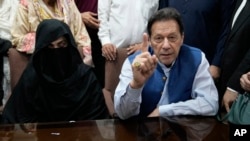An anti-corruption court in Pakistan Friday sentenced former Prime Minister Imran Khan and his wife to 14 years and seven years “rigorous imprisonment,” respectively, in a contentious graft scandal stemming from his time in office.
The tribunal established within the Rawalpindi prison complex, where Khan has been held since August 2023, delivered the repeatedly delayed verdict, stating that he was also fined around $3,500, while his spouse, Bushra Bibi, was fined half that amount. Following the conviction, the former first lady was taken into custody from the court premises.
The case is linked to the alleged misuse of authority involving the Al-Qadir University Project Trust that Khan, 72, and his wife established while in office from 2018 to 2022.
The couple was accused of receiving a piece of land in donation for the project from Malik Riaz, a Pakistani real estate tycoon, to build a nonprofit educational institute for the poor. In exchange, the prosecutors asserted that Khan misused his authority and allowed the use of approximately $232 million that British authorities recovered from Riaz as part of an investigation into his illicit activities and repatriated the funds to Pakistan to settle the businessman’s court penalties in his home country.
Khan’s involvement in allegedly facilitating Riaz’s corrupt practices resulted in legal complications for the former prime minister. His legal representatives vehemently rejected Friday’s verdict, asserting that it constitutes political victimization. They denied the allegation as “completely fabricated” that the former prime minister misused his authority to provide benefits to Riaz.
“Today’s verdict has tarnished the reputation of the judiciary,” Khan told reporters following the court’s ruling. “My wife is a housewife, who has nothing to do with this phony case,” he asserted in the remarks his party shared with the media.
“A dictator is doing all this,” Khan said, without elaborating. He has previously accused the chief of Pakistan’s powerful military, General Asim Munir, of being behind dozens of legal challenges facing him to keep Khan from returning to politics. The military rejects the charges.
Friday’s verdict is one of several convictions Khan has received since he was ousted from power in April 2022 after losing a parliamentary vote of confidence and becoming entangled in numerous lawsuits thereafter on corruption, unlawful marriage, and leaking state secrets charges.
The convictions were either suspended or overturned by appeals courts due to a lack of evidence. However, Pakistani authorities have consistently filed new charges to ensure that Khan stays in jail whenever he is acquitted of a case, or his sentence is suspended with an order for his release.
Khan’s Pakistan Tehreek-e-Insaf party stated Friday that the Al Qadir Trust case “lacks solid foundation and is bound to collapse” in the appeals court.
“All evidence and witness testimonies confirm that there has been no mismanagement or wrongdoing. Imran Khan and Bushra Bibi are merely trustees with no further involvement in the matter,” the statement said.
Prime Minister Shehbaz Sharif’s government defended the case and Friday’s ruling against Khan, asserting that the former prime minister and his party failed to prove their case through legal arguments.
“They could have defended themselves in court rather than turning to the media, which would have been a better approach,” Law Minister Azam Nazeer Tarar told a news conference following the verdict.
Khan, a former cricket-star-turned prime minister, accused the military of orchestrating his ouster from power to punish him for pushing against generals’ role in political affairs. The deposed leader survived an attempt on his life at a political rally before corruption and other charges were brought against him in 2023.
While military officials reject any role in Khan’s ouster and charges of Pakistan’s civilian matters, the country’s former army chief, General Qamar Javed Bajwa, admitted in a televised speech just days before stepping down from office in 2022 that his institution had been meddling in national politics in violation of the constitution for decades.
Friday’s court ruling came a day after Human Rights Watch accused Prime Minister Shehbaz Sharif’s government of “perpetuating a longstanding crackdown” on free expression, civil society, and political opponents.
“The space for free expression and dissent in Pakistan under the Sharif government is shrinking at an alarming pace,” said Patricia Gossman, associate Asia director at Human Rights Watch. “Pakistani authorities are repeating a decades-long cycle of power grabs and victimization of opponents at the expense of everyone’s human rights,” she added.





